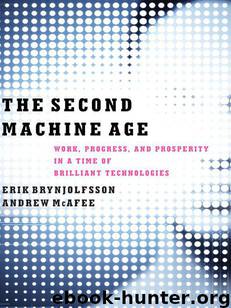The Second Machine Age: Work, Progress, and Prosperity in a Time of Brilliant Technologies by Brynjolfsson Erik & McAfee Andrew

Author:Brynjolfsson, Erik & McAfee, Andrew [Brynjolfsson, Erik]
Language: eng
Format: epub
Publisher: W. W. Norton & Company
Published: 2014-01-20T00:00:00+00:00
FIGURE 11.1 Labor Productivity and Private Employment
In this chapter, we’ll address three important questions about the future of the bounty and the spread. First, will the bounty overwhelm the spread? Second, can technology not only increase inequality but also create structural unemployment? And thirdly, what about globalization, the other great force transforming the economy—could it explain recent declines in wages and employment?
What’s Bigger, Bounty or Spread?
Thanks to technology, we are creating a more abundant world—one where we get more and more output from fewer inputs like raw materials, capital, and labor. In the years to come we will continue to benefit in the form of things that are relatively easy to measure, such as higher productivity, and things that are less susceptible to metrics, such as the boost we get from free digital goods.
The previous paragraph describes our current bounty in the dry vocabulary of economics. This is a shame and needs to be corrected—a phenomenon so fundamental and wonderful deserves better language. ‘Bounty’ doesn’t mean simply more cheap consumer goods and empty calories. As we noted in chapter 7, it also means simultaneously more choice, greater variety, and higher quality in many areas of our lives. It means heart surgeries performed without cracking the sternum and opening the chest cavity. It means constant access to the world’s best teachers combined with personalized self-assessments that let students know how well they’re mastering the material. It means that households have to spend less of their total budget over time on groceries, cars, clothing, and utilities. It means returning hearing to the deaf and, eventually, sight to the blind. It means less need to work doing boring, repetitive tasks and more opportunity for creative and interactive work.
The manifestations of progress are all based at least in part on digital technologies. When combined with political and economic systems that offer people choices instead of locking them in, technological advance is an awe-inspiring engine of betterment and bounty. It is also an engine driving spread, creating larger and larger differences over time in areas that we care about—wealth, income, standards of living, and opportunities for advancement. Some of these trends (particularly rising inequality) are also visible in other countries. We wish that progress in digital technologies were a rising tide that lifted all boats equally in all areas, but it’s not.
Technology is certainly not the only force causing this rise in spread, but it is one of the main ones. Today’s information technologies favor more-skilled over less-skilled workers, increase the returns to capital owners over labor, and increase the advantages that superstars have over everybody else. All of these trends increase spread—between those that have a job and those that don’t, between highly skilled and educated workers and less advanced ones, between superstars and the rest of us. It’s clear to us, from everything we’ve seen and learned recently, that all else being equal, future technologies will tend to increase spread, just as they will boost the bounty.
The fact that technology brings both bounty
Download
This site does not store any files on its server. We only index and link to content provided by other sites. Please contact the content providers to delete copyright contents if any and email us, we'll remove relevant links or contents immediately.
International Integration of the Brazilian Economy by Elias C. Grivoyannis(109962)
The Radium Girls by Kate Moore(12017)
Turbulence by E. J. Noyes(8040)
Nudge - Improving Decisions about Health, Wealth, and Happiness by Thaler Sunstein(7690)
The Black Swan by Nassim Nicholas Taleb(7106)
Rich Dad Poor Dad by Robert T. Kiyosaki(6607)
Pioneering Portfolio Management by David F. Swensen(6288)
Man-made Catastrophes and Risk Information Concealment by Dmitry Chernov & Didier Sornette(6004)
Zero to One by Peter Thiel(5786)
Secrecy World by Jake Bernstein(4740)
Millionaire: The Philanderer, Gambler, and Duelist Who Invented Modern Finance by Janet Gleeson(4465)
The Age of Surveillance Capitalism by Shoshana Zuboff(4275)
Skin in the Game by Nassim Nicholas Taleb(4237)
The Money Culture by Michael Lewis(4198)
Bullshit Jobs by David Graeber(4179)
Skin in the Game: Hidden Asymmetries in Daily Life by Nassim Nicholas Taleb(3989)
The Dhandho Investor by Mohnish Pabrai(3758)
The Wisdom of Finance by Mihir Desai(3731)
Blockchain Basics by Daniel Drescher(3574)
